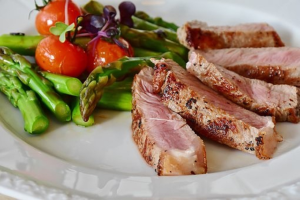
Lately, there has been discussion regarding the Keto Diet, which highlights the need for some clarification. How do we approach fad diets and how can we translate them in Ayurvedic terms?
There have been many diets promoted over the years. Here are some of the most popular:
- Keto Diet
- Paleo Diet
- Alkaline Diet
- Cabbage Soup Diet
- Dukan Diet
- Fruitarianism
- Juice Fasting
- KE Diet
- Paleolithic Diet
- South Beach Diet
- Superfood Diet
- Low-Carbohydrate Diet
- Atkins Diet
- High Carb/Low-Fat Diets
- Dr. Dean Ornish: Eat More, Weigh Less, The Good Carbohydrate Revolution
- The Pritikin Principle
- Liquid Diets
- Slim-Fast
- Etc.
Do they work, do they fail?
The Best, Healthiest Diet
The one and only - and easiest diet - to follow that will improve your health is:
- Avoid process foods, and eat natural food (predominantly plant-based).
- Get enough exercise and time to relax, with good sleep.
- Live in tune with nature.
- Be happy with who you are.
This diet is uncomplicated, cheap, and available to all, yet is the one that many people don’t follow. Instead, they are willing to try new miracle diets or pills that will give an instant fix to whatever problem one might have. Let's not even go into the unhealthy image of the perfect "healthy" body portrayed by society.
Almost all fad diets have some validity in their concepts, however, they are used in a selective way and can present severe health risks, especially when these diets are followed for weeks or months.
I don’t want to discuss each diet claim and whether it works or not. What I would like to discuss is how can we translate these diets in the Ayurvedic terms to predict their outcome.
The Ayurvedic Diet Approach
In Ayurveda, a balanced diet does not revolve around fats, carbohydrates, and proteins. There is no concept of calories, vitamins, and minerals.
According to Ayurveda, each person has his own individual constitution (like genetic code), that is a combination of the doshas: Vata, Pitta, and Kapha. The food you eat has the power to increase/decrease these elements in the body. Hence, it can potentially nurture and bring balance, or, act the opposite way, bringing unbalance and eventually disease.
Initially, it will be difficult to see things the Ayurvedic way. It takes some time to retrain your mind not to think in terms of calories, fat, carbs, etc.
To make this translation easier, notice what food is in this fad diet, and what is excluded.
For example, the Keto Diet is a high-protein, high fat, no-carb diet. How does this translate in Ayurvedic terms?
What are the qualities of carbs? Which doshas might increase and which would be pacified?
Then think about fats in the diet. What dosha will be pacified; what will increase? Do the same with proteins.
Now think how this diet will affect a Vata person (Vata imbalance), Pitta person (Pitta imbalance), and Kapha person (Kapha imbalance).
In a simplistic way, If the diet will pacify a Vata imbalance, and you apply this diet, eventually you will reach a point that Vata will return to balance, however, you are now over-stimulating/increasing Pitta and Kapha.
You can see how with, just the basic knowledge of the doshas, you can, in theory, predict the outcome of a diet.
If you have the list of food combining rules from Ayurveda, you can further investigate how each food in the diet will affect the doshas.
If you don’t have the list, or would like to understand how food influences the dosha, look at the gunas (qualities). Think about the Ayurvedic qualities of that food: heating, cold, moist, dry, rough, smooth, etc. Which are the gunas of each dosha (for example, Vata is dry, cold, etc.)? Think of the 6 tastes and what effect they have on the doshas.
When you then want to apply the diet to a person, you need to know their prakruti (constitution) and vikruti (current state of imbalance) to predict how this diet will affect this person.
If the person has a chronic disease or illness, and/or if they are weak, on medications/drugs, very young, and/or pregnant, diet becomes way more complicated. In these cases, it could be foolish to even try any of these fad diets, because they could put the health of this person (and unborn baby if pregnant) at serious risk.
What Are Your Thoughts?
- Has this post made you think differently about a diet that you have taken or want to try?
- Does this explain something that has happened to you or someone you know?
- Have you applied some Ayurvedic principles and noticed a change, if so, what have you noticed?
Raffaella di Nicola is an Ayurvedic Practitioner, Registered Yoga Teacher, and Reiki Master, with training and experience in Yoga Therapy, Therapeutic Thai Massage, Sound Healing, and Vedic Astrology. For more information about her classes and services, check out TheBalancedYoga.com.

